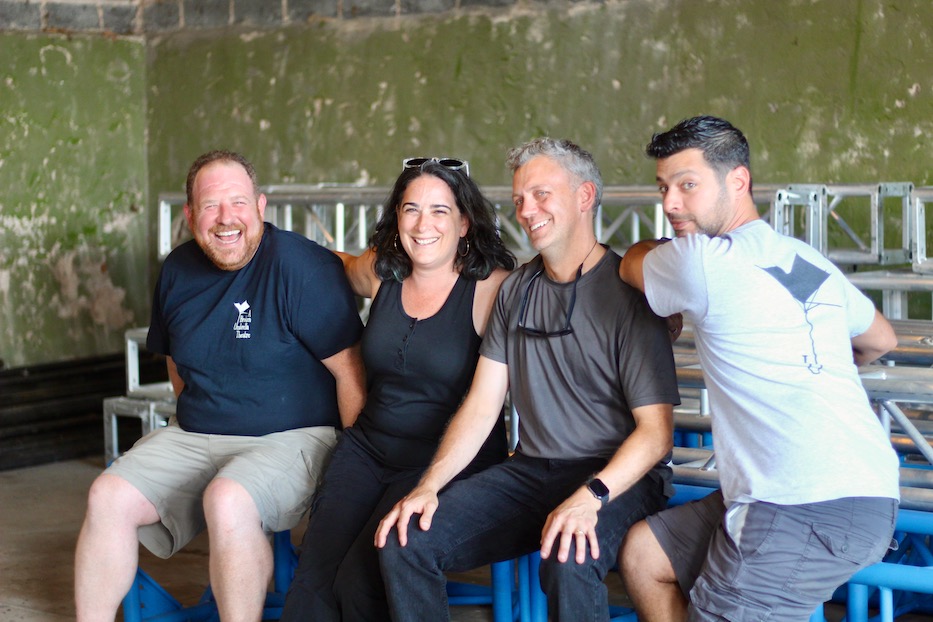
Beaver Hills | Culture & Community | Economic Development | A Broken Umbrella Theatre Company | Arts & Culture | Theater | Westville
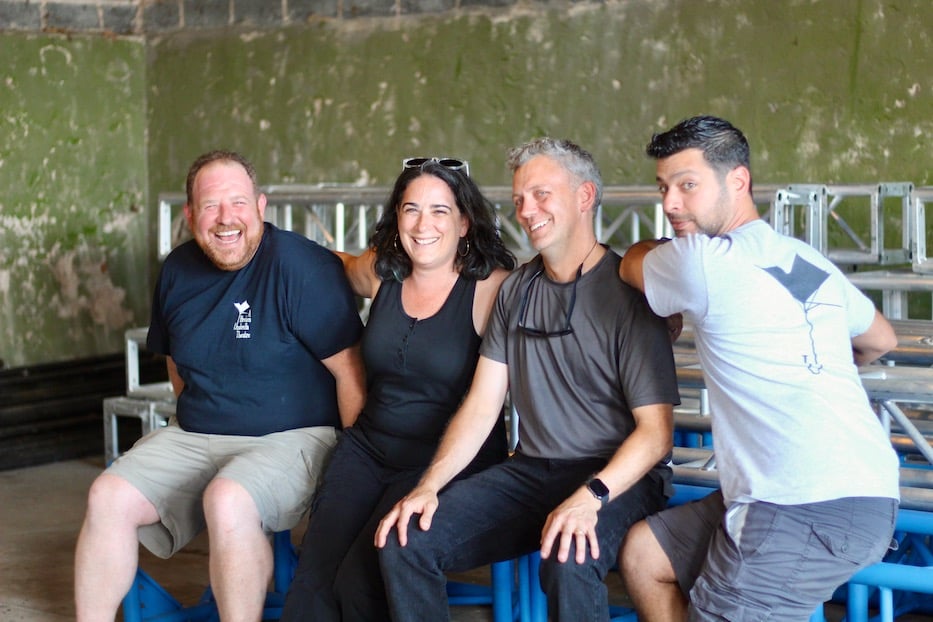
Ian Alderman, Rachel Alderman, Ryan Gardner, and Ruben Ortiz.
It’s still a sprawl of softened wood flooring and exposed brick, but Ian Alderman can already imagine a finished foyer, branching off into a cabaret on one side and black box theater on the other. If he pauses, he can see a bustling Saturday night, servers buzzing from table to table as a jazz band takes the whole room to church. Turn around, and he’ll point out the entrance to the black box, where a sprung floor can host dance one night, comedy the next, and maybe a musical rehearsal somewhere in between.
That vision is taking shape this month, as A Broken Umbrella Theatre (ABUT) launches its first campaign for "The Umbrella," a brick-and-mortar home at 280 Blake St. Over 10 years and multiple venues into its existence, the group has envisioned a multi-purpose, community arts hub in the building, the shell of a former dry cleaner and mechanic shop. It sits on the lip of New Haven’s Westville neighborhood, where the troupe had its first performance in 2009.
ABUT bought the building for $280,000 last October; a $500,000 “Good To Great” grant from CT Humanities and the Connecticut Department for Community and Economic Development has provided initial funding for renovation. On Saturday Aug. 12, the group will host a comedy and improv fundraiser with the Regicides to work toward a 20 percent match (that’s $100,000) to unlock that funding. Tickets and more information for that performance are available here; donate directly here.
“Every space we’ve been in, we’ve been there for quite a while,” said Alderman, a founding member of the group alongside his wife Rachel Alderman, ABUT Artistic Director Ruben Ortiz, Ryan Gardner and Chrissy Gardner Fox, in an interview at 280 Blake St. last week. “We want a place that we can come and create work, but also have a space that community organizations can thrive within.”
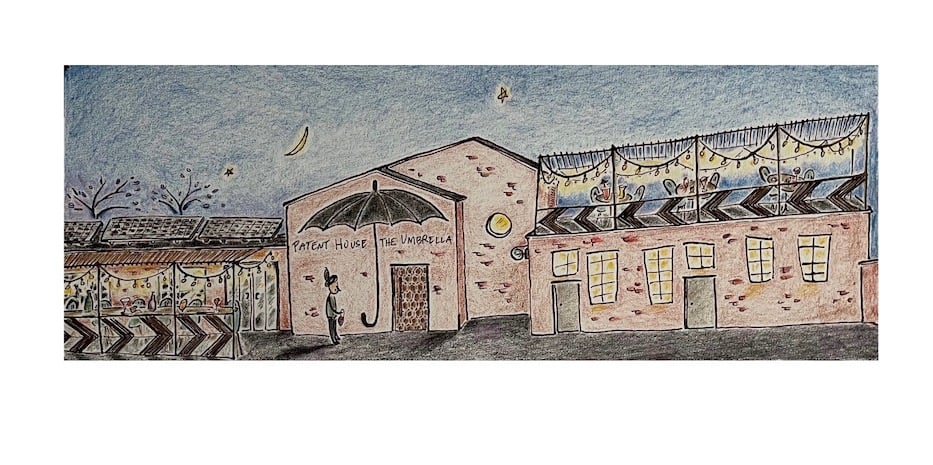
Brenna Burns Yu for Lotta Studio.
That hope for a permanent space—not just for one group, but for so many of New Haven’s artists—has been years in the making. Since its beginnings in New Haven’s Westville neighborhood, ABUT has created site-specific theater in different homes and neighborhoods, including Lyric Hall, Erector Square, and a former warehouse on State Street that later became the State House. Those spaces, in turn, have allowed the group to present performances across the city, from a tree in Edgewood Park to branches of the New Haven Free Public Library.
But those locations were never permanent: it felt like ABUT was often on the move, even as it grew its New Haven roots and worked with an increasing number of community partners. When it moved into The Smokestack, a former factory building that it still shares with Creative Me Daycare at 446A Blake St., that space provided room for storage and rehearsal, but was too small to host indoor performances. Even recently, The Regicides had to postpone a show for bad weather, making it hard to plan any long-term sort of run.
So when the Good To Great grant program became available earlier this year, it seemed like a no-brainer for the group. Since October 2022, ABUT has owned the 4,806 square foot building on Blake St., which for years operated as a dry cleaning business, and then briefly housed a mechanic shop. In 2018, Lunch Box 23 bought the building with plans to expand its popular food truck business, but hit a wall when the Covid-19 pandemic hit less than two years later.
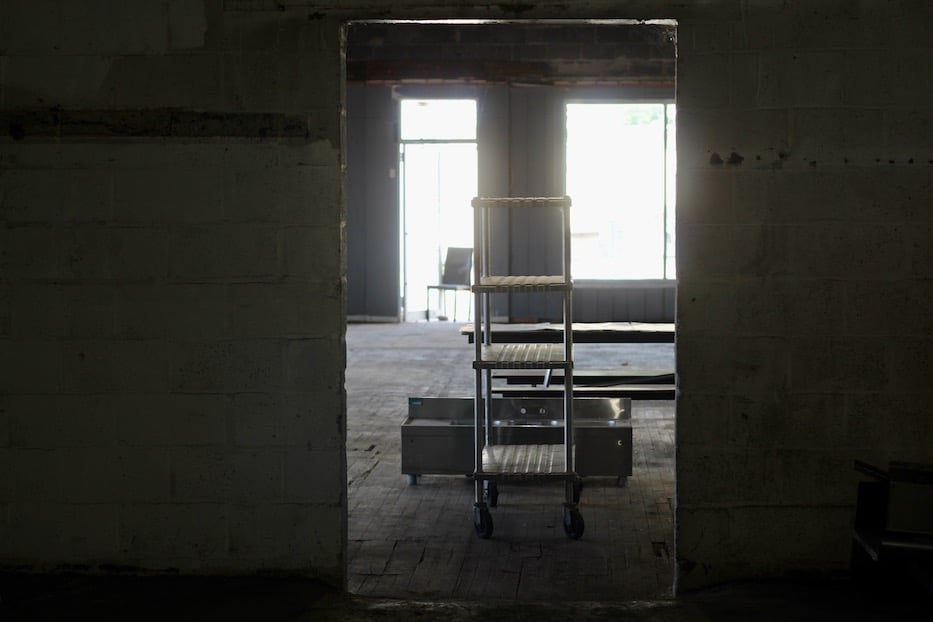
Lucy Gellman Photo.
After buying the building last year, ABUT began to work with lifelong New Havener Colin Caplan, who for years has been a troupe member and ABUT’s resident historian, to help reimagine the space (Caplan’s design firm, Magrisso Forte, is also just a few blocks away at 96 Blake St.). The $500,000 is just a starting point: ABUT ultimately expects the building’s renovation to take $1.75 to $2 million over two to three years
“The thing about a building like this is you never know what you’re going to encounter,” Gardner said as he looked through the Blake Street building, taking in the future home of cozy cabaret tables and brightly lit stage.
Already—and thanks in large part to an ensemble of dreamers who have always built from the ground up—it is taking shape little by little. With Caplan, ABUT members have planned the entrance from the side of the building, rather than the door that sits between two street-facing windows on Blake Street (those, in the planned vision, will go toward promotion). Outside, a small driveway will become an outdoor patio with tables and chairs, where patrons might chat or enjoy a drink before a performance.
Through the side—where ABUT ultimately wants an accordion door—there will be a small lobby and welcoming area, including a box office and first-floor storage space. Beyond the lobby are plans for a small kitchen and two ADA-accessible bathrooms, a corridor, theater prep space and tech booth. Already, Alderman can see a performance coming together in the tech booth, where a pile of curled leaves still sits scattered across the sun-dappled floor.
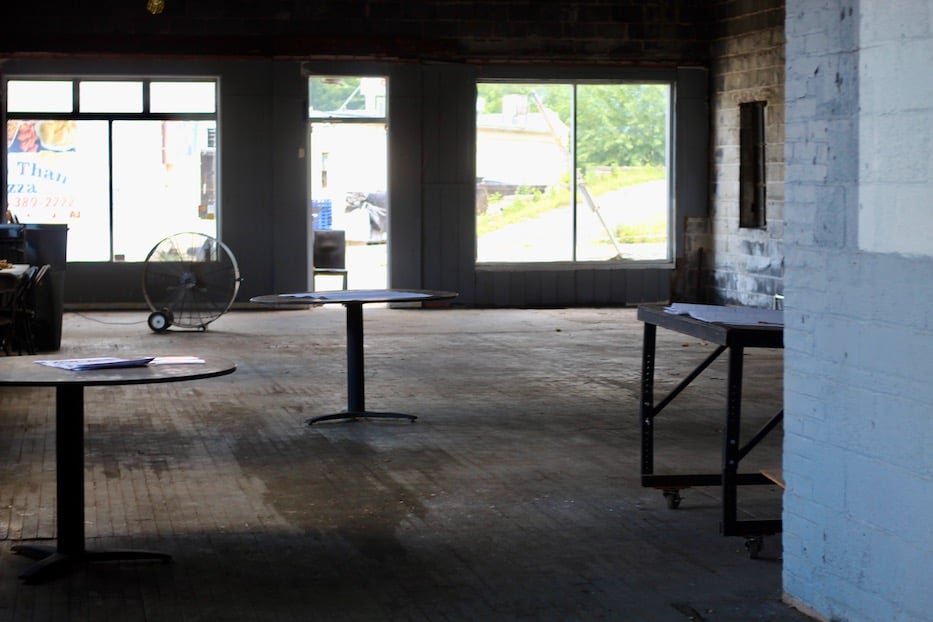
Former dry cleaner or future cabaret? Lucy Gellman Photo.
But it is in the two largest rooms on the first floor that Alderman, as well as Ortiz and several committed members of the group, see the most magic taking shape. To the right of the entryway, ABUT has planned for a black box theater that can seat up to 90 people on risers, or fewer for a more immersive show that might require standing room or a larger stage space. It plans to keep a garage door that is currently in the space, although it may replace the door's material.
To the left of the entrance, meanwhile, is a planned cabaret theater with tables, a stage, and more bathrooms and storage. It’s here, close to the kitchen, that ABUT members can already imagine a band or improv troupe or drag show in full swing, as patrons nosh on small plates and sip their drinks for a built-in dinner service. Alderman said that the company has already spoken to multiple local performing arts organizations who are potential partners, but asked not to disclose their names at this time.
Between the two spaces, there will be stairs for a second story, with the potential for a Limited Use / Limited Application (LULA) elevator for accessibility purposes at some point (that adds an additional layer of funding and logistical work, Gardner said). On the second floor, a site plan has allocated space for a green room, dressing rooms, bathrooms, storage and office space. There is also room for a shower and washer/dryer.
Those amenities aren’t just for ABUT, Alderman said: it’s to make it attractive to other cultural organizations who may rent it out during the week, when ABUT isn’t making use of it. The group currently plans to be in the building Thursday through Sunday.
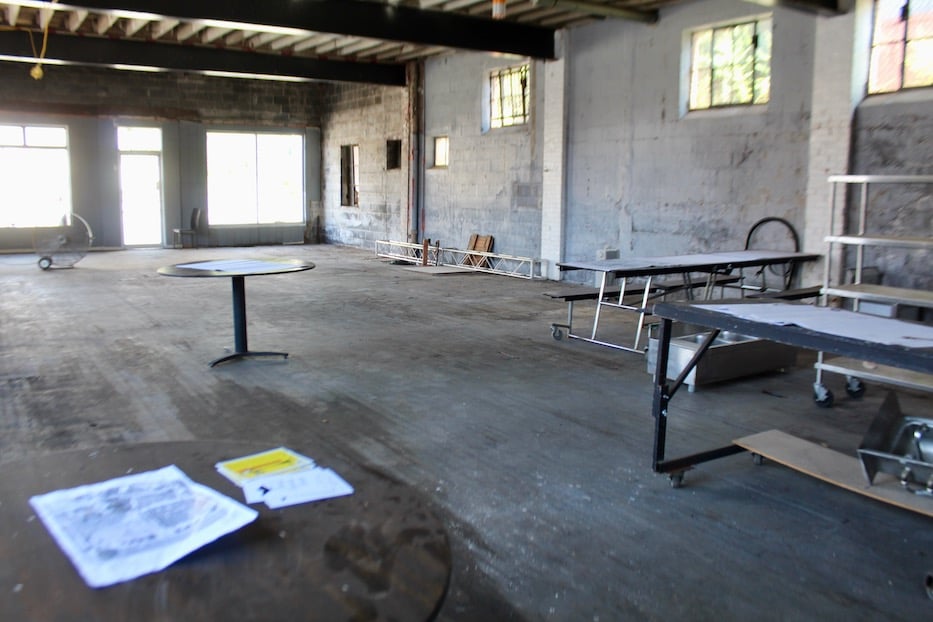
The $500,000 from the grant will go towards lighting equipment, the installation of a sprung floor in the black box, removal and creation of several walls and dividing spaces, and the addition of a second story. Because it is technically state dollars, the project will ultimately go out to bid: members of ABUT, several of whom work professionally in theater, can’t do the work themselves.
As sun filtered through the windows and soaked the surrounding parking lot last week, Alderman led a walkthrough of the building, gesturing animatedly to each empty room with a fleshed out vision for what it would become. A few meal carts, cafeteria tables, and an errant lamppost from his Chapel Street scrapyard dotted the space, to give a rough idea of what its future might be.
He opened his arms wide before the black box, to show where a dividing wall would be, and suddenly it was possible to imagine a dramatically lit performance just beyond the doorway, inviting patrons into a different world. If a visitor closed their eyes in the sun-soaked cabaret space, they could see New Haven Jazz Underground musicians or actors from Long Wharf Theatre on the stage, taking Blake Street on a journey through the arts.
The building is zoned for general business—under which food, drink, and live entertainment are all covered—meaning that its only hurdle could be reliable parking. Per current zoning code, there must be 64 parking spaces within 300 feet of the location. Next door there are 10 spaces, which sit empty after Cohen’s Key Shop closes at 5:30 every day and on the weekends. The lot for L. W. Beecher Museum Magnet School of Arts and Sciences, which is also nearby, is often empty. Asked if he was concerned, Alderman said that “we are in talks about parking solutions with various city officials.”
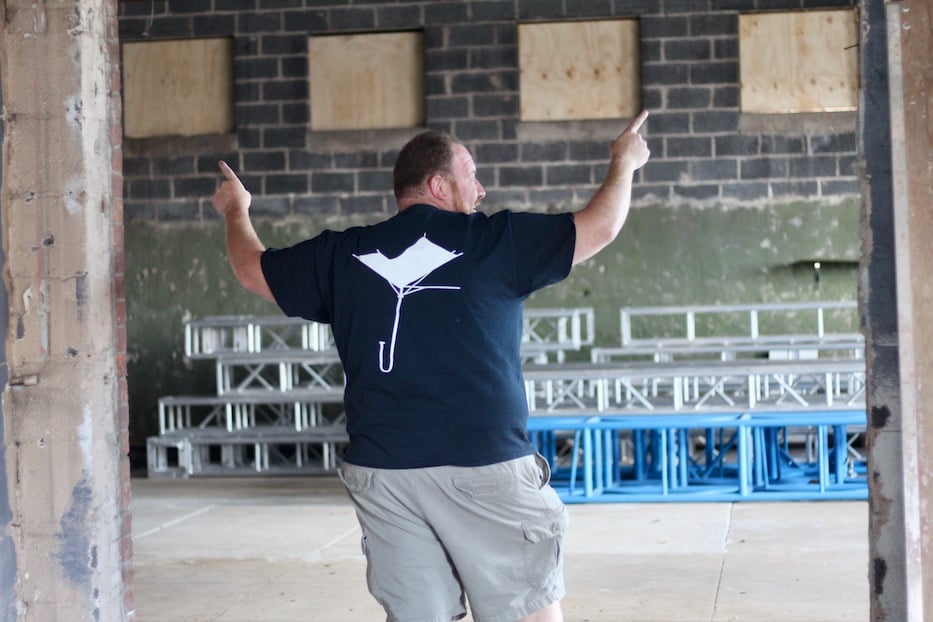
It might be an old dry cleaner, but Alderman can already see the black box theater.
Watching his step as he walked among the broken floorboards and even concrete, he also noted that the plan dovetails directly with the company’s mission of breathing new life into existing New Haven history. This is just the latest—and perhaps most literal—iteration of that vision. Alderman praised Lotta Studio and West River Arts Co-Founder Mistina Hanscom and illustrator Brenna Burns Yu for working on renderings that bring the space to life.
In that same spirit, the company has also begun thinking about how the building can also be a community resource, particularly for artists and cultural organizations that don’t have a full-time home, or need extra room for their performances, film festivals, open mic nights, jazz jam sessions, theater rehearsals and everything in between.
It comes at a time when several of the city’s arts organizations, from Long Wharf Theatre to Artspace New Haven, have become newly itinerant, while several of its artists and small arts nonprofits scramble each time they need a venue, or run into space and accessibility constraints. Adriane Jefferson, director of Arts, Culture & Tourism for the City of New Haven, called the space directly in line with New Haven’s cultural equity plan.
“I think that this can be a very transformative space,” she said in a phone call Monday afternoon. “It’s not just about A Broken Umbrella. It’s also about [asking], ‘How do we activate this as a space and as an incubator for artists who can’t necessarily afford to be in these spaces? For me, it exemplifies cultural equity.”
“This has become a space that is going to allow for so much vision, and for so many groups of people,” she added. “Not for nothing, there are a lot of community organizations like Long Wharf Theatre, and they’re constantly looking for space in New Haven. I think this could really be a hub in the Westville area. It's going to provide an access point to people who have not been able to find space.”
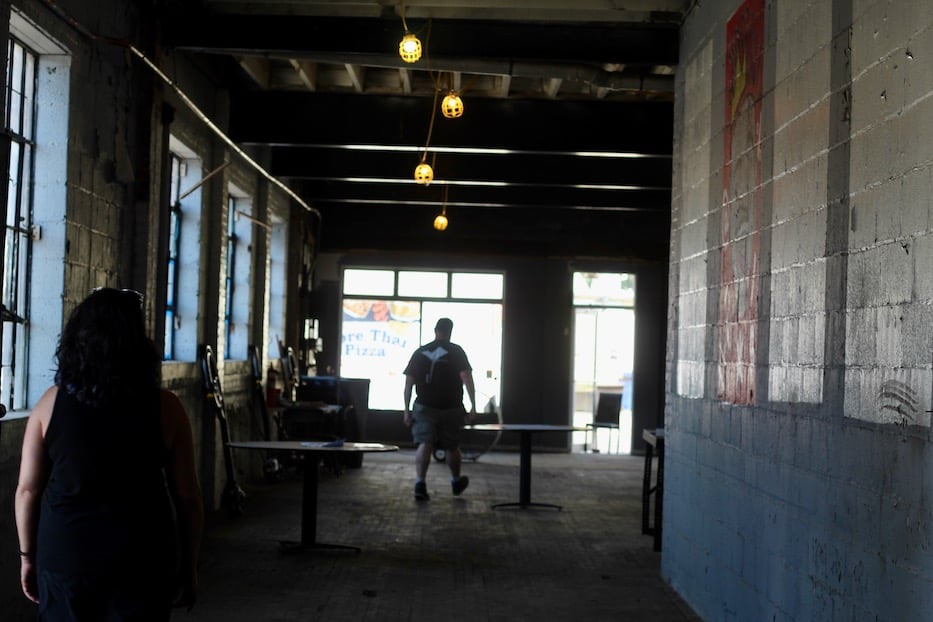
It’s a feeling that many of ABUT’s members, who work professionally in the arts in New Haven, echoed during the walkthrough last week. Working in the city, they’ve seen firsthand how hard it is to find reliable, affordable practice and performance space, particularly outside of institutional bubbles. The Yale Schwarzman Center, Dixwell Community Q House, and New Haven Ballet all have access to fully equipped dance studios, for instance—but local dance artists currently have no mechanism by which to rent them at free or highly subsidized rates.
That’s exactly where ABUT wants to come in, Ortiz said. In the past year, the company has started opening up its audition process and compensating artists for their time (the ensemble is still largely run through volunteer labor, and many ABUT members rely on the arts organizations that employ them). With other company members, he’s constantly thinking about how to build and grow a close-knit community, from Sunday night workshops to performances that rely on never saying the word “no.”
In the space last week, he, Gardner, Alderman and Alderman looked around wide-eyed, still holding a childlike excitement for what was to come. Ortiz and Ian Alderman stressed that this weekend's fundraiser is a significant first step: without the $100,000 that the group aims to raise, it can’t access the $500,000. With it, it can begin to build out its vision for a community arts hub that doesn't yet exist.
“Let’s open ourselves up to the community,” Alderman said.
A Broken Umbrella Theatre's comedy and improv troupe The Regicides will hold a fundraiser for the Blake Street space on Saturday, August 12 at 8 p.m. Tickets for that show here. Donate directly to A Broken Umbrella here.

